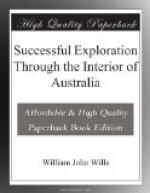Since scribbling the above, I have been up to the place from whence I had the walk I mentioned. The camels did not get away this time. We have shifted our quarters to a better place, about twenty miles down the creek. To-morrow we start for Eyre’s Creek, about two hundred miles towards the Una. There have been heavy thunderstorms towards the north, and I hope we shall find plenty of water. If so, I shall soon be able to send you a good long letter without resorting to the use of a pencil. I wish I could send mamma a few lines, but she must read yours and fancy it written to her: I have not even time to send a line to my father. Tell mamma that I am getting into that robust state of health that I always enjoy when in the bush; a tremendous appetite, and can eat anything. One of our chief articles of consumption is horseflesh: it is very nice; you would scarcely know it from beef. Give my love to all, and
Believe me,
Ever your affectionate brother,
William J. Wills.
. . .
Here we find my son, between the 1st and 15th of December, travelling about five hundred miles, and walking from eighty to ninety. McDonough, in his examination, gave altogether a falsified account respecting the loss of the camels, as he also made a bombastic statement of his great intimacy with Mr. Burke. The real truth is, that McDonough was the least trustworthy of the party. He would not have been taken by my son, but in the morning Mr. Burke had volunteered to accompany him, so that McDonough would not have been left alone; but after travelling a short distance, Mr. Burke did not feel well, and returned. At the place mentioned by my son as having dismounted, he told McDonough that he wished to make some observations, and was going to a rising ground at a distance; that the camels should feed, but he was not to lose sight of them for an instant. Instead of attending to his instructions, McDonough set to work to light a fire and boil his pannikin. Perhaps he went to sleep; for he pointed out some stunted bushes in the distance and said they were the camels. My son then sent him to search for them, but they could not be found. King, the only survivor of the party, on his examination, said:—
Mr. Wills told me that the camels were lost through McDonough’s neglect during the time he was writing and taking observations.
Question 1737. McDonough never disputed that, did he?—McDonough told me that it was while they were at supper in the evening; but I do not see how that could be, because they generally took supper, and ourselves, about six o’clock; and it was so dark that they could not see the camels, so that they were most likely lost when Mr. Wills was taking observations.
. . .
Mr. Burke, in his report from Cooper’s Creek, dated December the 13th, says:—“Mr. Wills, upon one occasion, travelled ninety miles to the north, without finding water, when his camels escaped, and he and the man who accompanied him were obliged to return on foot, which they accomplished in forty-eight hours. Fortunately, upon their return they found a pool of water. The three camels have not yet been recovered. . .Mr. Wills co-operates cordially with me. He is a most zealous and efficient officer.”




